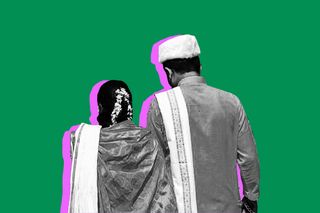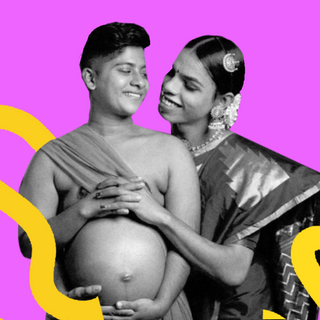
Can Self‑Respect Marriages Fix the Patriarchy, Casteism of Traditional Marriage?
The fundamental premise of a self-respect marriage asks: what if we could change the rules about who can comprise a family, and on what terms?

Last week, a cis woman and trans man from Tamil Nadu got married in a self-respect ceremony. Self-respect marriages are positioned as an alternative to conventional marriages: their disregard for Brahminical rituals, caste endogamy, religious restrictions, and gender norms, arguably make self-respect marriages a feminist and anti-caste answer to the traditional institution of marriage.
The feminist position on marriage has been clear for a while: it is a patriarchal institution that keeps women confined to the domestic sphere, beholden with care work, and treated as the benefactor of a husband. However, debates around marriage have been complex: anti-caste voices have posited inter-caste marriage as a solution to dissolving caste-endogamy and, by extension, caste-based segregation itself. Here is where the idea of the self-respect marriage offered a promising alternative. The fundamental premise of a self-respect marriage asks: what if we could change the rules about who can comprise a family, and on what terms?
Self-respect marriages — or as they are called in Tamil, suyamariyathai — trace their origin back to the 1920s. In 1925, Tamil social reformer Periyar spearheaded the self-respect movement — one that sought equal rights for people of all castes and encouraged people from marginalized castes to live with dignity and self-respect. Self-respect marriages were conceptualized as part of the larger self-respect movement.
Periyar regarded conventional marriages as being mere financial arrangements between two families that often ended up causing great debt through dowry. Further, conventional marriages tend to be caste-endogamous, meaning that they’re facilitated among members of the same caste in a bid to maintain “purity.” Thus, marriages often act as tools for reinforcing caste segregation and hierarchy. Self-respect marriages were envisioned as an idea that could counter these trends and reframe marriage as liberatory: the self-respect movement thus actively encouraged inter-caste marriages, seeking to replace arranged marriages taking place along established caste lines.
The first self-respect marriage took place in 1928, and was officiated by Periyar himself. These weddings rejected Brahminical scriptures and texts and also did away with having a Brahmin priest as the officiator. Proponents of the movement argued that not only were conventional marriages a tool to propagate casteism, they also were alien to Tamil culture as the marriage ceremony is traditionally conducted in Sanskrit. In addition to the absence of Brahmin priests, then, suyamariyathai weddings also do not feature a holy fire or a mangalsutra.
“At the same time, they looked to marriage as a place to rebuild the Tamil community on a more grassroots, bottom-up level… to get rid of caste, to get rid of the boundaries that separated one caste from another whether it was around marriage, sexuality, socializing, inter-dining, eating with each other and celebrating with each other,” Dr. Mytheli Sreenivas, historian and gender studies scholar, told The Swaddle.
Related on The Swaddle:
Tell Me More: Talking Caste and Marriage With Jyotsna Siddarth, Founder of Project Anti‑Caste Love
Anti-caste marriages are thus feminist too — with the premise of marriage being to reinstate autonomy, self-respect marriages address how women are often merely tools to maintain caste purity rather than autonomous individuals in their own right.
On the other hand, there may be larger challenges in translating the theoretical principles of suyamariyathai ceremonies into everyday practice. The first of those challenges is legal. Self-respect weddings are recognized as a valid form of marriage only in one state in the country — Tamil Nadu. But, even in Tamil Nadu, self-respect marriages can be counted as legally valid only if it is a marriage between two Hindus, shrinking space for the legal recognition of inter-faith couples who would want to marry in this manner. In a way, this goes against the self-respect movement’s goals of moving away from caste-Hindu rituals.
It’s partly why the self-respect movement eventually lost momentum. Despite Dravidian parties — political parties that trace their origin directly to the movement — being in power in Tamil Nadu for the majority of the post-independence period, discrimination and atrocities against the most marginalized castes and tribes is still rampant in the state, showing that self-respect marriage alone is insufficient.
Other challenges lie in the unequal power distribution in the institution of marriage itself. In an earlier piece for The Swaddle, Rajvi Desai noted the inherently un-feminist nature of the institution of marriage: “The purpose of marriage, as we know it today, has evolved from a transaction to being [about] love — but the gender roles entrenched in marriage have not progressed, neither has the legal system that has failed to catch up with the times and accord women the dignity and respect they deserve as human beings.”
Further, researching on couples who got married through self-respect ceremonies, historian Sarah Hodges wrote that “over the course of the 20th century in the Tamil south, marriage and family proved to be unstable vehicles for the revolutionary transformation of socio-political domains.” In other words, self-respect marriages alone are insufficient as tools for revolutionizing existing structural issues with the institution of the family — of which marriage is only one part.
Still, if anything, self-respect marriages are a start toward reclaiming a more radical future of marriage. The Tamil Nadu couple’s wedding shows that what’s otherwise deemed impossible under a casteist, cis-heteropatriarchal institution, isn’t — paving the way for more radical queer, feminist, and anti-caste futures.
Amlan Sarkar is a staff writer at TheSwaddle. He writes about the intersection between pop culture and politics. You can reach him on Instagram @amlansarkr.
Related


Nikki Haley Is Running for US President – Signaling the Conservative Indian Diaspora’s Rising Power
